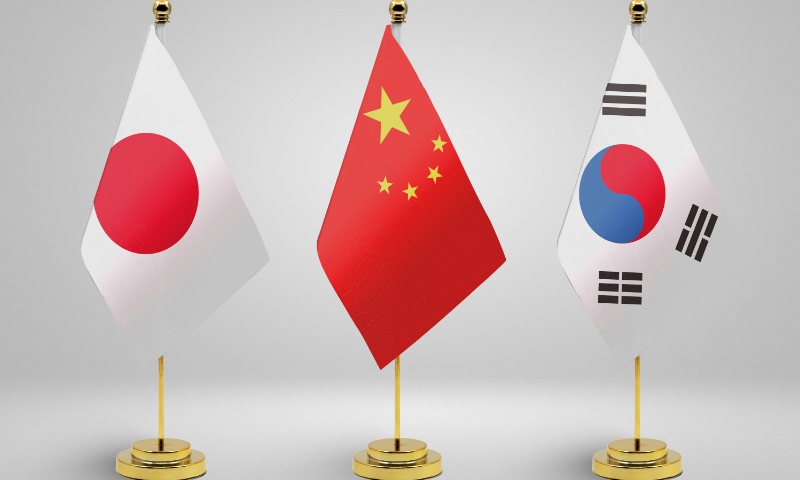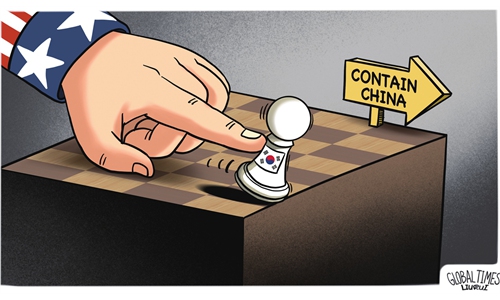Trilateral summit a litmus test for SK's diplomatic course correction: Global Times editorial

File Photo
Foreign Minister of the Republic of Korea (ROK) Cho Tae-yul will visit China from May 13 to 14, Chinese Foreign Ministry spokesperson Lin Jian announced on Friday. According to Yonhap News Agency, in addition to discussions on the development direction of bilateral relations, supply chain cooperation, Korean Peninsula nuclear issue and other topics, the two sides will also discuss and coordinate on the specifics of the upcoming trilateral summit between China, Japan, and South Korea. South Korean officials have previously stated that the ninth China-Japan-South Korea leaders' meeting is tentatively scheduled to be held in Seoul from May 26 to 27, with preparations being actively coordinated among the three parties. This has been viewed positively in South Korea, with some public opinion suggesting that the South Korean government is making efforts to find balance in its foreign policy.Since the current administration of South Korea took office, it has promoted "value-based" diplomacy, strengthening the US-South Korea alliance, improving relations with Japan, and adopting a tough stance toward North Korea with the backing of the US and Japan. In terms of relations with China, this government has shown shortsightedness, aligning itself with certain regional "mini-groups" and following the US and Japan in involving itself in questions related to Taiwan and the South China Sea. As pointed out by South Korean media, despite engaging in unconditional allied diplomacy with Western countries including the US, the treatment it received in return has not been ideal, which has led to introspection within South Korea. As communications between China and the US and other Western countries are restored, there are increasing calls for the South Korean government to balance its diplomacy.
It is to be commended that since last year, when South Korea took on the role of the rotating chair for trilateral cooperation among China, Japan and South Korea, it has shown a strong willingness to restart high-level dialogues. The trilateral foreign ministers' meeting, which was held for the first time in over four years on November 26 last year in Busan, South Korea, reaffirmed the consensus on cooperation and agreed to create conditions and prepare for the leaders' meeting. This meeting marked a significant step toward getting trilateral cooperation back on track. Since then, the three parties have continued to coordinate on the timing of the leaders' meeting, with South Korea continuing to fulfill its responsibilities as chair this year and maintaining communication with China and Japan.
This year marks the 25th anniversary of the initiation of China-Japan-South Korea cooperation mechanism, a significant milestone. Launched amid the Asian financial crisis in 1999, trilateral cooperation has continued to advance through ups and downs, achieving substantial results. Today, it has developed into the most institutionalized, wide-ranging, and substantive multilateral cooperation framework in Northeast Asia, consisting of the leaders' meeting at its core, 21 ministerial meetings, and over 70 dialogue mechanisms, covering more than 30 areas including trade, logistics, culture, education, environment, technology and health.
Regrettably, since the eighth meeting held in Chengdu, China in December 2019, the trilateral summit among China, Japan, and South Korea has been interrupted for four and a half years. During this period, cooperation among the three countries has been difficult, reflecting the intricate national relations and geopolitical contradictions in Northeast Asia. Since last year, with the prolongation of the Russia-Ukraine conflict and accelerated US efforts to contain China, tensions on the Korean Peninsula have persisted, and the signs of camp confrontation in Northeast Asia have become increasingly apparent. The resumption of high-level dialogue between China, Japan, and South Korea will not only inject long-lost political momentum into trilateral cooperation but also help dispel the misconception of camp confrontation among some countries and dissipate the "new cold war" clouds hanging over Northeast Asia.
This summit will also provide the South Korean government with a rare opportunity for diplomatic "course correction," especially considering that bilateral interaction with China was a major focus of this summit. For South Korea to leverage this trilateral summit to improve China-South Korea relations, it needs to demonstrate more sincerity and take concrete actions. Creating a more favorable political environment and social atmosphere for bilateral dialogue is essential to ensuring that this summit achieves its intended goals.
Undeniably, against the backdrop of political conservatism and vigorous American enticement, some figures in the South Korean political arena are increasingly wary of and competitive toward China. They echo the "China threat" narrative propagated by the US and Japan, and align with the mind-set of "relying on the US to contain China," which poses challenges to South Korea's rational and comprehensive approach to China and the management of bilateral relations. However, China and South Korea are irreplaceable neighbors, an objective fact that will never change. After over 30 years of diplomatic relations, China and South Korea have become highly integrated partners with deeply intertwined interests and supply chains. Strengthening dialogue and communication at all levels and safeguarding the overall cooperation between the two sides are common needs. Fundamentally, to stabilize and develop China-South Korea relations, both sides must consistently anchor themselves to the broad direction of friendly cooperation. This is not an optional question but a mandatory task for both parties to accomplish.
At last year's trilateral foreign ministers' meeting between China, Japan, and South Korea, Chinese Foreign Minister Wang Yi outlined the direction of trilateral cooperation with three key words: The three countries should serve as "pacesetters" of East Asian cooperation, drive East Asian cooperation through trilateral cooperation, adhere to open regionalism, oppose drawing ideological lines, and resist turning regional cooperation into bloc politics; the three countries should serve as "stabilizers" for safeguarding regional peace and security, and stick to resolving differences and disputes through dialogue and consultation by peaceful means; the three countries should serve as "relief valves" in resolving hotspot issues, and the urgent priority is to cool down the situation, create necessary conditions for the resumption of dialogue and take meaningful actions to this end. It is hoped that as the chairing country, South Korea will uphold these principles and make active efforts to ensure the meeting's success.

